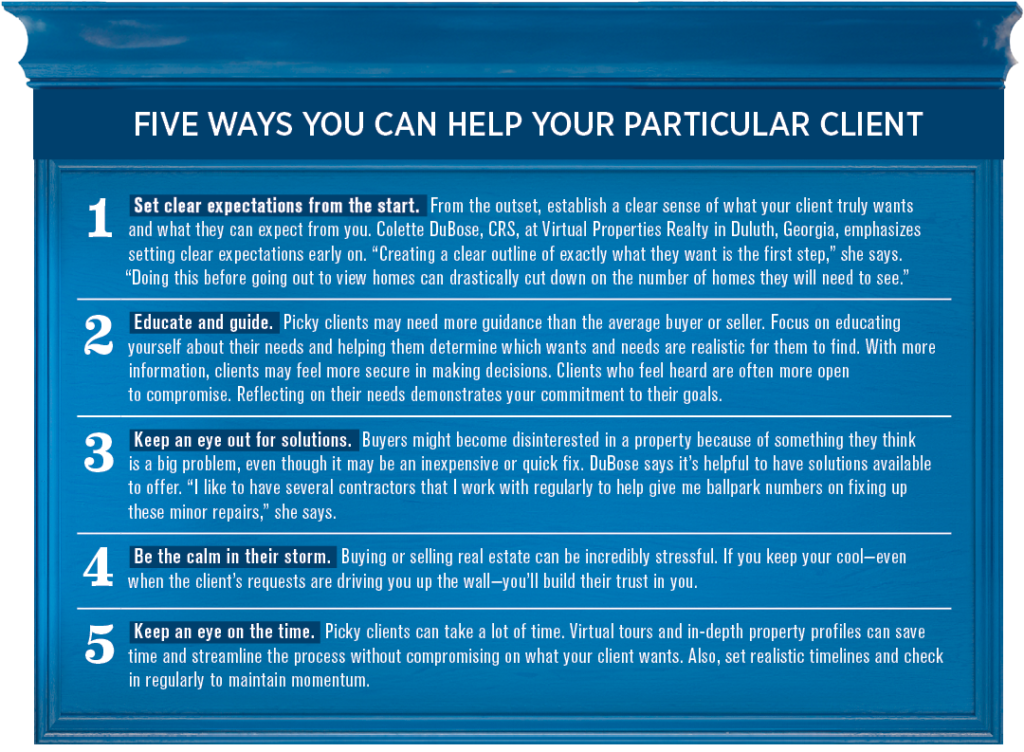Buyers who can’t compromise can make an agent’s job difficult
By Jason Henninger
Dealing with overly particular clients may not be much fun, but it’s not hard to empathize. After all, buying or selling a home is likely the largest transaction many people will ever be part of. And more than the money, it is a home, with all the needs, memories and emotions that come with the word. Being specific with likes and dislikes is natural, even beneficial, to the buying and selling process when the stakes are so high. But there are also times when the client is stuck on a concept that may not be feasible. How do you deal with bringing their dreams to life without having the process become a nightmare?
Granted, some people are just never satisfied. But for the most part, clients are merely those who have very specific criteria, sometimes so specific that it borders on unreasonable. While their focus can be a little frustrating at times, their pickiness usually stems from genuine concern over finding a space that resonates with their vision. Personal preferences, past experiences and the significant financial impact all play a part. But there is a silver lining to working with picky clients: They can help you hone your attention to detail, which in turn can lead to more refined and customer-tailored service.
Beginning with empathy is important. In many cases, what looks like pickiness results from being overwhelmed and trying to negotiate the enormity of the task. Consequently, strategies to reduce how overwhelmed the client feels can be a big help.
Rob Hundley, CRS, an agent with Asher Chaim Real Estate in Phoenix, Arizona, believes in selectively narrowing the options to guide clients toward what they want. “Over the years, I have worked with many ‘picky’ buyers. During that time, I have learned how to use a dual alternative approach. The basic idea is that too many options leads to choice paralysis,” he says. “Narrowing, or curating, the options helps the buyers reach a decision they will love. The key is knowing which choices to offer. This means listening to your buyers as well as watching their reactions to the options. Start broad and narrow with each decision.”
That approach is a bit of a balancing act. You want to give them choices, but not overwhelm them with too many. At the same time, you want to curate, to use Hundley’s term, without restricting.

Negotiating the non-negotiable
At times, picky clients will hold firm on things they simply can’t have. Rather than push, try to find creative solutions that still meet their core needs, even when a client’s preference may not align with what you believe is the best choice. For example, do they really want a swimming pool they can’t afford, or are they just envisioning fun summer afternoons with their family? If it’s the former, you may be able to find a way to compromise in some more flexible criteria that allow them to afford a pool. If it’s the latter, you can work on finding them a great backyard with plenty of space for barbecues and areas for kids to play.
It’s up to you as the expert to gently guide them without disregarding their vision. It’s essential to ensure that clients understand the value of the deals you present, especially when they’re fixated on personal preferences that might not be in their best interest. Managing expectations can be done while keeping the client feeling their needs are being taken seriously. It’s less about saying no than about saying, “What if?” or, “Have you considered this option?”
While the process of working with picky clients may be more complex, it is also an opportunity to establish a rewarding relationship. When the client feels that you have listened, taken them seriously and worked with them earnestly—even if there was a little compromise here and there—they are definitely going to keep you in mind when it comes time to sell or buy a new place or recommend an agent to a friend.
Sharpen your skills with eLearnings to better represent your buyers at www.CRS.com/education/education-catalog.
Photo: Getty Images/SimoneN/4×6/DNY59








